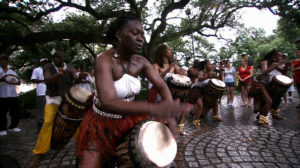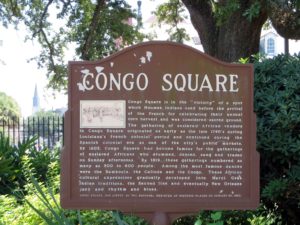The early styles of song and dance dating back to the 18th century in the Congo Square of New Orleans can be attributed to enslaved Africans. Located in the historical Tremé neighborhood, it was the meeting point for several decades during the Spanish-ruled era of New Orleans.
As in modern day times, Sundays were considered a “day of rest” where the Spaniards allowed those enslaved the day off. Ultimately, enslaved Africans were able to gather and listen to traditional sounds, participate in conventional dance and enjoy the taste of original African cuisine. Fast forward centuries later, these practices are widely prevalent and have contributed a great deal to the richness and cultural heritage of the Crescent City.
The influential effect and traditional customs on Sunday afternoons is of significant value to the Congo Square, making it a popular location known around the world. It is considered as one of the distinct locations in the heart of the city that birthed what we now consider New Orleans jazz.
The rhythmic sounds and musical variations played in the Congo Square have become a fundamental landscape of primitive New Orleans jazz; found in the early sounds of numerous musical compositions creating a distinct legacy to the indigenous culture. Contemporary African-based rhythm, sounds, song and dance can be seen and heard in brass bands, second line parades, jazz funerals and the Mardi Gras Indians.
Ultimately, the gathering of enslaved Africans greatly impacted and
As a result of the city’s urban renewal, many houses and buildings within the vicinity of the Congo Square have been annihilated. The area has since been renamed and replaced with Louis Armstrong Park. Aside from the evolution of jazz and the Congo Square being synonymous, it has also maintained the musical legacy and cultural traditions of enslaved Africans of the past, and for centuries to come.


